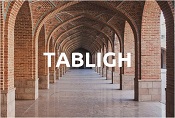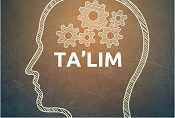| |
Can't see images? Enable option to load images on your phone or email app.
A Darwesh-e-Qadian from Bengal
By: Saleh Ahmed (Boston, MA Majlis)
 The Arabic word Darwesh means “one who takes a vow of austerity and turns away from worldly pursuits, devoting his life for the sake of Islam”. Darweshan-e-Qadian refers to the 313 Ahmadis who followed Hazrat Musleh Maud's (ra) instructions and chose to remain in Qadian after India's partition to protect the Ahmadiyya Muslim Jamaat's sacred sites. The Arabic word Darwesh means “one who takes a vow of austerity and turns away from worldly pursuits, devoting his life for the sake of Islam”. Darweshan-e-Qadian refers to the 313 Ahmadis who followed Hazrat Musleh Maud's (ra) instructions and chose to remain in Qadian after India's partition to protect the Ahmadiyya Muslim Jamaat's sacred sites.
The year 1912 was a significant year for the Ahmadi Jamaat in the British Indian colony's East Bengal province. This year, Mukarram Maulana Sayed Abdul Wahid sahib laid the foundation stone of Ahmadiyyat by accepting Ahmadiyyat in Qadian, and after returning to East Bengal, he began accepting Bai'at, and Ahmadiyyat spread throughout Bengal.
In the same year, a devout woman from Katiadi's Algirchar village, Sundari Begum, gave birth to a boy, named Abdus Salam, who would later become a Darwesh-e-Qadian. His father's name was Kalu Haji. Mokarram Salam had a gentle and humble nature since he was a child. His parents were devout Muslims who taught him the Quran and Salat and enrolled him in a primary school to further his education. However, his father died when he was an adolescent, and he was unable to continue his education beyond the primary level, so he turned to agricultural work with his other family members. Many Islamic gatherings were organized in the villages in his childhood age, and people used to talk about the advent signs of Imam Mahdi (as); he loved to attend those gatherings and listen to religious talks.
In 1944, he took Bai'at at the hand of Allamah Zillur Rahman and formally joined Ahmadiyya Jamaat. Following his acceptance of Islam Ahmadiyyat, he faced severe persecution. First, his wife's family forcibly separated him from his wife and children, threatening that if he did not abandon his faith, they would not let his wife live with him. Villagers, neighbours, and his other relatives and even siblings all opposed him vehemently and told him to abandon his faith. But he was determined about his faith, saying that even if they killed him, he would not abandon it.
One day, the entire village gathered at his house and forcibly removed him from his home, pressuring him to recite Tawba and leave Ahmadiyyat. He was determined, quiet, and calm, and humbly refused the village people's pressure. When the villagers realized they couldn't get him to change his mind about Imam Mahdi (as) and the Ahmadiyya Jamaat, they began beating him, and he only said 'Allah' 'Allah' with each blow. This severe beating failed to persuade him to change his mind about Ahmadiyyat, so the villagers stuffed him into a jute sack and dumped him in the jungle, threatening not to bring him back to the village unless he changed his mind. Luckily, he was rescued by an Ahmadi.
In 1944, Mokarram Khalilur Rahman sahib sent him to Qadian to attend Jalsa Qadian and study more about Ahmadiyat.There, Mokarram Salam received prayers from Khalifa Saani (ra) and fellow followers of Imam Mahdi (as), as he completed the Moyallem course from Madrasa Ahmadiyya, and dedicated himself to serving Jamaat. When the riots in Punjab began in 1947, he expressed his desire to Khalifa Saani's (ra) to become a Darwesh. Khalifa Saani (ra) accepted his desire and let him serve as Darwesh. After getting this assignment, he worked tirelessly to protect the Ahmadiyya Muslim Jamaat's sacred places in Qadian. Following the riot, Khalifa Saani (ra) advised the Darweshans to return to their respective countries, and then in 1952, he returned to East Pakistan (former Bengal province of British India Colony). He married Mohtarma Sufia Begum after returning to his birthplace and dedicated himself for teaching and propagating of Islam Ahmadiyyat until his death. On July 10, 1987, he passed away leaving his wife, five daughters and a son. (Innalillahe wa inna ilaihe rajiun). May Allah, the Almighty, grant him peace and place him among those who will receive Allah's blessings on the Day of Judgment. Ameen.
(The author of this article, Saleh Ahmed is the youngest son of Mohtarma Shamsun Nahar, the eldest daughter of Mokarram Darwesh Abdus Salam.) Fitness and Faith building
(Mahmood Hanif, Central Jersey, NJ Majlis)
 Alhumdulillah, Central Jersey Majlis participated enthusiastically in the 40+Fit Challenge that ran during the summer of 2021, with 11 Ansar participating, 7 of whom cycled over 80 miles in the month. Rizwan Akbar from our majlis placed second overall with 867 miles logged. Alhumdulillah, Central Jersey Majlis participated enthusiastically in the 40+Fit Challenge that ran during the summer of 2021, with 11 Ansar participating, 7 of whom cycled over 80 miles in the month. Rizwan Akbar from our majlis placed second overall with 867 miles logged.
Many members (myself included) caught the 'cycling bug' as a result of this initiative and we resolved to continue cycling during weekends whenever possible. In order to combine both spiritual and physical activities, we decided to meet after Fajr on Saturdays/Sundays, depending on work and Jamaat schedules, to ride together. Alhamdolillah since then, Central Jersey Ansar have ridden in Sandy Hook National Park (11 miles), different segments of the Henry Hudson trail (approximately 10 miles each), the D&R and D&L Canal Trails (around 20 miles) and a trip to the D&L Trail along the Lehigh Gorge in Pennsylvania (about 23 miles), as well biking or walking in the local park close to the masjid. Members who participated include Abdul Nasir (our local Jamaat president), Rizwan Akbar, Masroor Sajid, Hammad Malik, Khalid Ahmad, Syed Mahmood Ahmad, Wajid Buttar and Hisham Malik (a guest Khadim). Yousuf Syed and Dr Imtiaz Chaudhry have also joined us to walk segments of the trails.
We are blessed with many scenic cycling trails in most states and NJ is no exception. Some trails are paved, and others are crushed limestone or gravel. They are very safe to ride as they are away from motor vehicles and many pass-through wonderful scenery. Many are converted from old railway lines so are typically very flat and easy to ride. We have found cycling to be an enjoyable and a healthy group activity. For those who are worried about being able to ride long distances, pedal-assist electric bikes provide a way to enjoy cycling while having a motor to help you along when the going gets tough.
May Allah enable us to stay fit and healthy through these kind of activities (Ameen)
Send us your stories of brotherhood, Ijtima memories, or any other inspiring experience that we can share with Ansar brothers via this e-newsletter.
Department of Publications
Majlis Ansarullah USA |  |
| |           Contact Us ♦ Sadr Majlis
♦ Editor |








